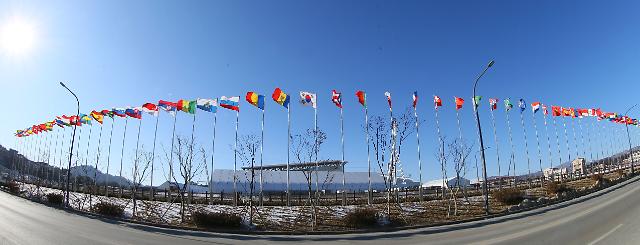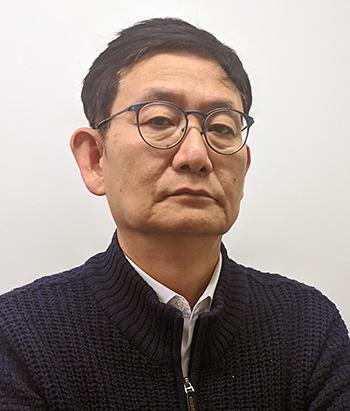
[Namkung Jinwoong - timeid@ajunews.com]

[Lee Yong-woong]
SEOUL, Jan. 31 (Aju News) -- The Winter Olympics in Pyeongchang is drawing near.
Two years later, the Tokyo Summer Olympic Games will take place in 2020, followed by the Beijing Winter Olympics in 2022. Now, as everyone is debating the possibility of an unprecedented nuclear war on the Korean peninsula, a 'peace chain' that penetrates the time and space of Korea, China and Japan kicks off.
Japanese sports stars Shizuka Arakawa and Daisuke Takahashi have already participated in the Pyeongchang Olympic torch relay, and Chinese director Zhang Yimou will command an eight-minute performance to introduce Beijing, the next Winter Olympic host city, at the closing ceremony of the Pyeongchang Winter Olympics. The 'Peace Chain' connecting the Olympics in Korea, China and Japan is now taking its first step.
Coubertin, who founded the International Olympic Committee (IOC), stressed: Asking people to love one another is childish, demanding respect for one another is undesirable, and they must learn about each other before they can respect each other. The Olympic Games did provide such a stage.
Professor Kim Jae-han of the Hallym University asserted in his thesis 'Peace and Unification Effect of the Olympics': In preparation for the Pyeongchang Olympics, we should seek the opportunity of peace on the Korean peninsula. The 1988 Olympics in Seoul played an important role in the collapse of the Cold War. Three decades later, the 2018 Pyeongchang Olympics should be promoted to carry out the central function of collapsing the Cold War islands in the post-Cold War era.
Professor Kang Won-taek of Seoul National University pointed out in his book, 'The Recognition of the Roh Tae-woo Era': When President Roh Tae-woo took office in 1988, the Cold War currents were weakening, and he hastened diplomatic ties with the East European countries in the face of the Seoul Olympics and achieved diplomatic relations with the Soviet Union and China after the Cold War era collapsed.
The transition of recognition is so difficult as Kang said that at the time, the conservative forces recognized Roh Tae-woo almost as a progressive regime.
However, the 24th Seoul Olympics in 1988 turned out to be the largest in Olympic history, drawing some 160 countries from all over the world under the banner of "unity and advancement". At the time, the Republic of Korea was not stranded at the end of the Cold War but changed its status into an international protagonist in the transition to the post-Cold War.
Although there is a controversy over whether it is "Peace Olympics" or "Pyongyang Olympics", the Pyeongchang Olympics is already becoming a peace festival of humankind as the United States is sending the biggest Olympic delegation at the critical conjuncture of a possible devastating nuclear war. China and Japan, which have to prepare for the Olympics one after another, are striving to bring the heat of Pyeongchang to their own countries.
Abe visits Pyeongchang, though he would pursue a settlement of the 'comfort women' dispute. Pyeongchang is facing a fateful obligation to bring the peace Olympics to perfection, and it is now seen walking on its fateful path.
On September 10, 2000, IOC head Juan Antonio Samaranch announced at the opening ceremony of the Sydney Olympics that the two Koreas agreed to march together under the so-called unification flag. The joint march continued at the Athens Olympics in 2004 and the Torino Winter Olympics in 2006, but it was suspended at the 2008 Beijing Olympics. A joint Olympic march by the two Koreas is nothing new.
Of course, the participation of the divided countries in the Olympics and their country names have always been controversial.
Professor Kim said in his paper that East and West Germany tried to participate individually in the Helsinki Olympics in 1952, but the IOC recommended the integration of East and West German teams in accordance with the principle of 'only one NOC per country'. East and West Germany fielded a single team in the 1956, 1960 and 1964 Olympic Games in the name of 'the United Team of Germany', or IOC's official French name EUA (Équipe Unifiée d'Allemagne).
It is difficult at first to get close, but it becomes a habit when it is repeated. It is important to make a stage to get to know each other first, as Coubertin says.
The current situation is that Trump and Kim Jung-un loudly say there is a nuclear button on their desk.
Albert Einstein said, "I do not know what weapons will be used in World War III, but in World War IV, it will definitely be a stone and a wooden bar." It is such a situation that his words are being recalled seriously.
President Moon Jae-in said the Pyeongchang Olympics ignited the inter-Korean dialogue dramatically at a time when relations are at their lowest ebb since the 1950-53 Korean War and in the shadow of war on the Korean peninsula.
President Moon said that if we fail to gain a momentum for dialogue through the Pyeongchang Olympics, it will be difficult to assess the difficulties of our diplomacy and security and it is not easy to get a chance for dialogue again. It seems that the word 'being in a dire extremity' is used in this case.
Poet Ko Eun screamed in his 'Poem for Peace':
'Peace was a bird.
As gunfire rang out, all the birds disappeared.
The 20th century was an age of huge wars.
They in turn led to the long, drawn-out Cold War.
What a tragedy!
The Cold War became a doctrine.
The birds wandered, lost.'
We should not greet such a time that the bird of peace will fly away after being surprised by the gunshot again on the Korean peninsula. In this regard, it is our due obligation to realize that the Pyeongchang Olympics should be promoted to 'Peace Olympics' and open the starting point for building a "Peace Chain of Korea, China and Japan'.


![[COLUMN] Is it the end of dog farming?](https://image.ajunews.com/content/image/2023/12/06/20231206165042934346.jpeg)
![[OPINION] Alberta steps forward as natural resources partner for Korean companies](https://image.ajunews.com/content/image/2023/11/24/20231124152536516223.png)
![[COLUMN] Study-in-rural-village education project creates hometown for future generations](https://image.ajunews.com/content/image/2023/03/14/20230314171302400526.png)